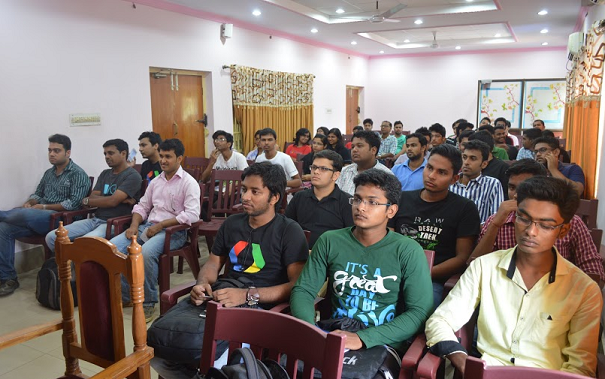Odia Wikipedia meets Google Developer Group
Odia Wikimedian Sailesh Patnaik presenting about Odia Wikipedia at Google Developer Group Bhubaneswar
This is a guest post by Wikimedian Sailesh Patnaik who has been a ardent contributor in Odia-language Wikipedia and other Wikimedia projects and has led outreach and partnership building initiatives to grow the Wikimedia projects in Odia and other Indian languages. In this post Sailesh shares his personal experience from his interaction at the Google Extended I/O organised by Google Developer Group in Bhubaneswar, Odisha. All the views are author’s personal views.
On this June 14 Google Developer Group Bhubaneswar organised an extended I/O at Bhubaneswar. To my surprise I found that there were more than 60 participants attending the conference. Basanta Kumar Maharana. TELL WHO HE IS, was the speaker in the event. Basanta shared his memories from Google I/O 2015, San Francisco and demonstrated about the new launch and updates of Google. It was quite interesting for me to learn about various Google apps (?) kike Google cardboard, Android M, etc.
In an informal interaction with the host Sanjib Parida, he proposed me to speak about Odia Wikipedia there who came to know about the project while attending Odia Wikipedia's 13th anniversary.
I started my talk by asking four questions to the audience:
- How many of the audience know about Wikipedia? (Everyone raised hands.)
- Who have copied content from Wikipedia for assignments? (People giggled about it, 50-60% of the participants nodded saying yes!)
- Who knows that anyone can “edit” Wikipedia? (the count reduced to about 10-20%)
- Who knows about Odia Wikipedia and contributes in creating and editing articles? (Only 4-5 people said yes, I found 2-3 of them being contributors to Odia Wikipedia)
I started my talk with a brief introduction to the history of Odia Wikipedia and how it was started in 2002 as one of the first four Indic language Wikipedia projects along with Assamese, Malayalam and Punjabi.
Odia Wikipedia was in dormant for the next eight years which was intervened when Wikimedians like Subhashish Panigrahi, Ashutosh Kar, Anshuman Giri, Mrutyunjaya Kar and others started building a community to improve and increase the content of Odia Wikipedia. Now we have grown as a community consisting about 17 active editors and the project has more than 8800 articles. The monthly page view of Odia Wikipedia has grown to more than 800,000 from merely 200,000 in 2011. We have three active Odia-language Wikimedia projects; Odia Wikipedia, the largest Odia online encyclopedia, online library Odia Wikisource, and multilingual online dictionary Odia Wiktionary. Odia Wikipedia community has not limited their work only in editing articles, rather has expanded into many other aspects of Odia computing. On the day of Odia Wikipedia’s 13th anniversary it has launched a converter that can convert many non-Unicode encodings into Unicode. We have been supported by CIS-A2K for many activities to grow our community and the Odia Wikimedia projects. Like Odia Wikipedia we have 20 more Wikipedia projects in other Indic languages and in over 288 languages globally. Hindi Wikipedia among all the Indic Wikipedia projects has the highest number of articles whereas Malayalam Wikipedia has the highest number of quality articles.
 |
|---|
| Pictured above: Participants at the conference organized by the Google Developer Group at Bhubaneswar |
Some of the state governments have been quite open and positive in bringing Wikipedia into academics. The Government of Kerala has introduced Wikipedia contribution in its curriculum for BA and MA students and The Government of Tamilnadu has introduced Tamil Wikipedia to participants at the International Tamil Conference which helped the Tamil Wikimedia community in expanding the community. Awareness and community building are two major challenges for us at this moment. I invited the participants there to take part in the Wikimedia movement.
I touched upon the Odia input for the audience. While it was quite difficult a few years back for Odia input it is no longer a challenge. With the help of the Android app “Indic Keyboard” we can also edit Odia Wikipedia from mobile phones. I myself have used it for editing Wikipedia, for tweeting and posting Facebook status in Odia. After the talk I was asked a few questions. There are two important ones I would like to share here. To the question “how can I contribute in Odia Wikipedia? Do I have to install any keyboard for it?” I elaborated how anyone can edit and expand articles or create new Wikipedia articles in Odia just by creating a new account and logging in to https://or.wikipedia.org, and how the Wikimedia projects like Wikipedia have an input tool called Universal Language Selector (ULS) enabled in them and one does not need to install any additional input method. I was asked by one from the here is no support from the government at this moment but we are constant effort to collaborate audience about the Government of Odisha helping to grow Odia Wikipedia.
Many participants came and personally greeted me after the event was over. I was really excited to share the news about our (Odia Wikimedia community's plans for creating Bhubaneswar Wiki Group/WikiTungi with two active communities in engineering colleges like CET and KIIT. It was a wonderful experience at Google I/O and I hope to grow our Wikimedia community by collaborating with more like minded communities.


